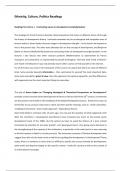Summary
Summary Notes for Ethnicity, Culture and Politics
**Summary Notes for Globalization and Development Course**
These summary notes provide a concise yet comprehensive overview of the key topics covered in the Globalization and Development course. They encapsulate the major political, social, and cultural themes related to globalization and deve...
[Show more]
Preview 4 out of 56 pages
Uploaded on
December 24, 2024
Number of pages
56
Written in
2024/2025
Type
Summary
development studies
university of groningen
globalization and development
ethnicity culture and politics
rijksuniversiteit groningen
Institution
Rijksuniversiteit Groningen (RuG)
Education
Ethnicity, Culture and Politics
Course
LBA025B05
All documents for this subject (1)
$6.94
100% satisfaction guarantee
Immediately available after payment
Both online and in PDF
No strings attached
Ethnicity,)Culture,)Politics)Readings!




